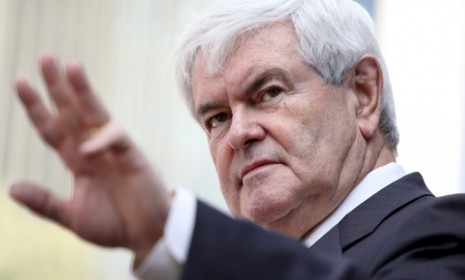How Newt Gingrich could kill the Tea Party
Newt is the sort of Beltway insider Tea Partiers are supposed to despise. But they support him, and that's a fatal mistake, says Conor Friedersdorf at The Atlantic

A free daily email with the biggest news stories of the day – and the best features from TheWeek.com
You are now subscribed
Your newsletter sign-up was successful
As Newt Gingrich's surge to the top of the GOP presidential polls continues, Conor Friedersdorf at The Atlantic marvels at new Gallup data that shows 82 percent of Tea Party-affiliated Republicans deem Gingrich an "acceptable presidential nominee," compared to only 58 percent for Romney. Tea Partiers "don't seem to realize that if he wins the nod their movement is doomed," Friedersdorf says. After all, the former House speaker supported many of the Bush-era big government programs that the Tea Party hates, including TARP, No Child Left Behind, and the "budget-busting" drug entitlement program Medicare Part D. But if Gingrich wins the nomination, it seems likely that Tea Party members would support him. That would do irreparable damage to the movement, says Friedersdorf, "as it would be the ultimate act of sacrificing principle and ideological purity for the sake of beating Democrats." Here's why:
President Gingrich would take office, and proceed to behave like... well, a decades-long Washington insider who supported No Child Left Behind, Medicare Part D, the attempt at a guest worker program, TARP, and the Harriet Miers nomination. Every conservative betrayal would be a reminder that the Tea Party helped elect just the sort of man they'd so righteously vowed to eschew.
The label wouldn't stand for anything anymore.
The Week
Escape your echo chamber. Get the facts behind the news, plus analysis from multiple perspectives.

Sign up for The Week's Free Newsletters
From our morning news briefing to a weekly Good News Newsletter, get the best of The Week delivered directly to your inbox.
From our morning news briefing to a weekly Good News Newsletter, get the best of The Week delivered directly to your inbox.
And a Gingrich loss to Obama? In a world where the Tea Party was seen as responsible for his rise, it would be discrediting, as losses always are for the faction that urges a divisive candidate. Along with the blame game, there'd be four more years of Obama, which Tea Partiers regard as the ultimate failure.
Read the entire article at The Atlantic.
A free daily email with the biggest news stories of the day – and the best features from TheWeek.com
-
 Switzerland could vote to cap its population
Switzerland could vote to cap its populationUnder the Radar Swiss People’s Party proposes referendum on radical anti-immigration measure to limit residents to 10 million
-
 Political cartoons for February 15
Political cartoons for February 15Cartoons Sunday's political cartoons include political ventriloquism, Europe in the middle, and more
-
 The broken water companies failing England and Wales
The broken water companies failing England and WalesExplainer With rising bills, deteriorating river health and a lack of investment, regulators face an uphill battle to stabilise the industry
-
 The billionaires’ wealth tax: a catastrophe for California?
The billionaires’ wealth tax: a catastrophe for California?Talking Point Peter Thiel and Larry Page preparing to change state residency
-
 Bari Weiss’ ‘60 Minutes’ scandal is about more than one report
Bari Weiss’ ‘60 Minutes’ scandal is about more than one reportIN THE SPOTLIGHT By blocking an approved segment on a controversial prison holding US deportees in El Salvador, the editor-in-chief of CBS News has become the main story
-
 Has Zohran Mamdani shown the Democrats how to win again?
Has Zohran Mamdani shown the Democrats how to win again?Today’s Big Question New York City mayoral election touted as victory for left-wing populists but moderate centrist wins elsewhere present more complex path for Democratic Party
-
 Millions turn out for anti-Trump ‘No Kings’ rallies
Millions turn out for anti-Trump ‘No Kings’ ralliesSpeed Read An estimated 7 million people participated, 2 million more than at the first ‘No Kings’ protest in June
-
 Ghislaine Maxwell: angling for a Trump pardon
Ghislaine Maxwell: angling for a Trump pardonTalking Point Convicted sex trafficker's testimony could shed new light on president's links to Jeffrey Epstein
-
 The last words and final moments of 40 presidents
The last words and final moments of 40 presidentsThe Explainer Some are eloquent quotes worthy of the holders of the highest office in the nation, and others... aren't
-
 The JFK files: the truth at last?
The JFK files: the truth at last?In The Spotlight More than 64,000 previously classified documents relating the 1963 assassination of John F. Kennedy have been released by the Trump administration
-
 'Seriously, not literally': how should the world take Donald Trump?
'Seriously, not literally': how should the world take Donald Trump?Today's big question White House rhetoric and reality look likely to become increasingly blurred